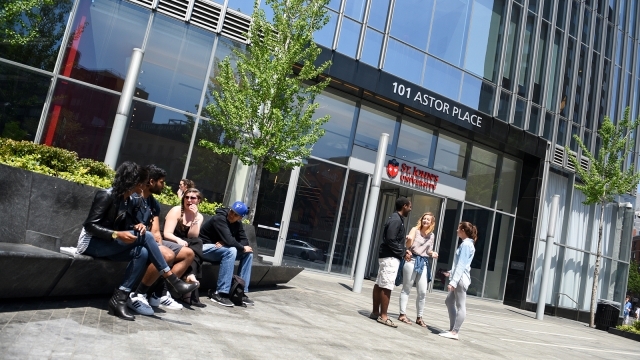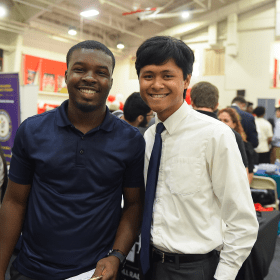Exploring a Career in Actuarial Science: an Expert Q&A

Are you interested in risk assessment, financial forecasting, and strategic decision-making? If so, get ready to explore the fascinating world of actuarial science. In this Q&A, we talk to St. John's University alum Brandon Alcaide,’19C, ’20GSRM. He is a Senior Actuarial Associate at TIAA, a well-known Fortune 100 financial services company providing extensive financial solutions.
With a master’s degree (M.S.) in actuarial science from St. John’s University and an impressive background in mathematics, Mr. Alcaide has amassed a wealth of experience in the field. Having been a part of prestigious organizations at St. John’s, such as Gamma Iota Sigma and Pi Mu Epsilon, and serving as a mentor during his undergraduate years, he brings a unique perspective to the actuarial profession.
We will delve into Mr. Alcaide’s journey, gain insights into the intricacies of the actuarial world, and learn how his educational and work experiences have shaped his successful path. So, if you’re interested in exploring a career in actuarial science - this Q&A has you covered!
I. Exploring Actuarial Science and Career Motivation.
What motivated you to pursue an actuarial science degree?
I have always had an interest in mathematics. I wanted to use my mathematical skills in practical scenarios but wasn’t particularly interested in teaching. In high school, I watched a movie that mentioned the term ‘actuary.’ I wasn’t familiar with the profession then, but I researched and visited actuary.org.
This taught me about the field, its functions, and the required qualifications.
After this, I was sure I wanted to pursue a career in actuarial science, which meant earning an actuarial science degree. Actuarial science is a specialized field that aligns perfectly with all my interests.
II. Education, Campus Activities, and Preparation for Success.
How have your campus activities at St. John’s (e.g., societies, tutoring, and student mentorship) benefited your career?
I thoroughly enjoyed my experience at St. John’s University. Through my tutoring positions, I was able to refine my communication skills, particularly in technical subjects.
Additionally, mentoring was crucial in enhancing my leadership, planning, and teamwork abilities. I learned how to help first-year students succeed at the University by understanding and supporting their needs.
What is one invaluable campus resource students should utilize when preparing for an actuary career path?
Students often focus heavily on exam preparation, but it’s important to remember the value of other skills. The Ellen Thrower Center for Apprenticeship and Career Services at St. John’s University was beneficial in crafting my résumé, interview skills, and different essential abilities for my career.
Do your math bachelor’s degree and actuarial science master’s degree match your role as a Senior Actuarial Associate? If yes, can you explain why?
My math degree helped me improve my technical and problem-solving skills, even though it wasn’t a direct path. It was a foundation for exploring related topics and developing my critical thinking abilities.
My master’s degree in actuarial science perfectly aligned with my career goals. It provided invaluable assistance in preparing for exams, navigating the career fair, and acing interviews. The program gave me a solid foundation and clear direction for my future endeavors.
Could you elaborate further on how your time at St. John's University aided you in preparing for interviews?
The tutoring and campus societies I participated in provided me with exciting stories to share. I was able to demonstrate my practical communication skills by discussing various scenarios. This is a positive trait for an early-entry actuary to showcase in an interview.
Can you provide some insights regarding your actuary internship at Athene? Also, could you share the most significant lesson you learned from that experience?
During my internship at Athene, I took my first step toward my career. The experience taught me important lessons about being an actuary and showed me how big and important the field is.
I learned that actuaries are essential in business decisions, and their work helps big companies succeed. The internship also gave me insight into the workings of the business and helped me understand my place in it.
III. Navigating Actuarial Work and Aspiring to Success.
What is one thing you learned about actuarial science that you didn’t know before working in the field?
I wasn’t aware of the number of individuals required in an actuary team, but there are several areas of specialization. These include reserve experts with their own teams and those who work on modeling and must regularly update and maintain their models. Additionally, there is corporate planning. A team of actuaries can comprise up to 100 highly qualified and experienced members.
What are the three critical skills a student should possess when considering a career in actuarial science?
When working in actuarial science, it’s important to possess strong communication skills, analytical problem-solving abilities, and perseverance. Effective communication is crucial when dealing with complex ideas and projects, as it helps you convey information clearly to professionals and non-professionals. As for problem-solving, while you’ll learn the basics on the job, thinking creatively and outside the box is essential to improve existing models and systems.
Finally, determination and perseverance are vital traits necessary for success in the field. While they may not be skills that can be developed, they can be honed through dedication and preparation.
What do actuaries do? Could you describe your role as a Senior Actuarial Associate at TIAA?
My job as an actuary is to ensure that an insurance company’s annuity and life insurance offerings remain financially healthy. This involves analyzing and modifying potential risks, investigating the company’s financial reserves and capital, and ensuring they can handle future obligations.
To make educated predictions, our team of actuaries conducts in-depth studies and creates models that help us understand how the company’s investments and commitments interact.
As a part of TIAA, we are members of the actuary development program, which offers a broad range of work experience, support for all Society of Actuaries exams, and the opportunity to develop communication and leadership skills through mentoring and networking. This program typically involves a rotational period of 12 to 24 months, during which actuarial associates aid with risk analysis, management, experience studies, actuarial modeling, and related tasks.
What advice would you give to a student interested in becoming an actuary, based on your current knowledge and experiences?
A career in this actuarial science can be highly satisfying and offer a healthy balance between work and personal life. Taking time preparing for exams and connecting with others in the industry is essential. Remember your initial motivation for pursuing this career. As a new student, prepare for a lengthy test-taking process, but it’s ultimately worth it. Concentrate on studying, bring calculators to exams, and keep pushing through challenges.
Elevate Your Future with Actuarial Science at St. John’s University!
Ready to embrace the world of risk assessment and financial forecasting? Our Master of Science program equips you with essential skills, expert mentoring, and exam readiness. Start your path to success with St. John’s University today.







